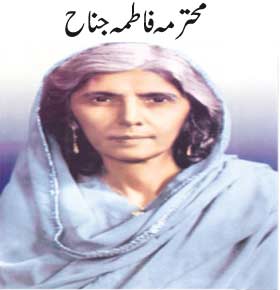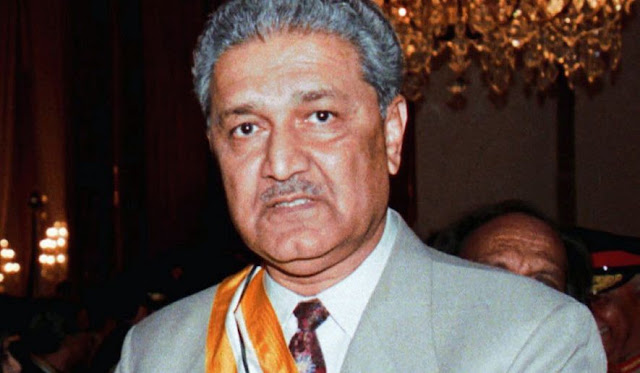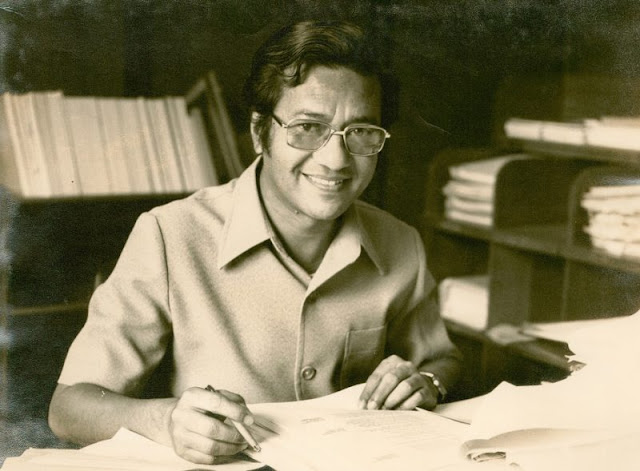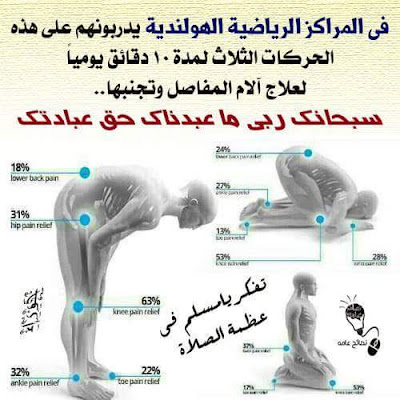Fatima Jinnah
Fatima Jinnah ( فاطمہ جناح; 31 July 1893 – 9 July 1967), widely known as Māder-e Millat ("Mother of the Nation"), was a Pakistani dental surgeon, biographer, stateswoman, and one of the leading founders of Pakistan. She was the younger sister of Quaid-e-Azam Muhammad Ali Jinnah. After obtaining a dental degree from the University of Calcutta in 1923, She became a close associate and an adviser to her older brother, Muhammad Ali Jinnah, who later became the first Governor-General of Pakistan. A strong critic of the British Raj, she emerged as a strong advocate of the two-nation theory and a leading member of the All-India Muslim League.
After the independence of Pakistan, Jinnah co-founded the Pakistan Women's Association which played an integral role in the settlement of the women migrants in the newly formed country. She remained the closest confidant of her brother until his death. After his death, Fatima was banned from addressing the nation until 1951; her 1951 radio address to the nation was heavily censored by the Liaquat administration. She wrote the book, My Brother, in 1955 but it was only published 32 years later, in 1987, due to censorship by the establishment, who had accused Fatima of 'antinationalist material'. Even when published several pages from the book's manuscript were left out.
Jinnah came out of her self-imposed political retirement in 1965 to participate in the presidential election against military dictator Ayub Khan. She was backed by a consortium of political parties, and despite political rigging by the military, won two of Pakistan's largest cities, Karachi and Dhaka. The U.S. magazine, Time, while reporting on the 1965 election campaign, wrote that Jinnah faced attacks on her modesty and patriotism by Ayub Khan and his allies.
Jinnah died in Karachi on 9 July 1967. Her death is subject to controversy, as some reports have alleged that she died of unnatural causes. Her family members had demanded an inquiry, however, the government blocked their request. She remains one of the most honored leaders in Pakistan, with nearly half a million people attending her funeral in Karachi.
Her legacy is associated with her support for civil rights, her struggle in the Pakistan Movement and her devotion to her brother. Referred to as Māder-e Millat ("Mother of the Nation") and Khātūn-e Pākistān (Urdu: — "Lady of Pakistan"), many institutions and public spaces have been named in her honor.
Early life and career
Fatima was born on 31 July 1893, the youngest of seven children to Jinnahbhai Poonja and his wife Mithibai, in a rented apartment on the second floor of Wazir Mansion, Karachi. Fatima had six siblings: Muhammad Ali, Ahmad Ali, Bunde Ali, Rahmat Ali, Maryam, and Shireen. Of her siblings, she was the closest to Muhammad Ali Jinnah who became her guardian upon the death of their father in 1901. She joined the Bandra Convent in Bombay in 1902. In 1919, she was admitted to the highly competitive University of Calcutta where she attended the Dr. R. Ahmed Dental College. After she graduated, she opened a dental clinic in Bombay in 1923.
Muhammad Ali Jinnah's companion
She lived with her brother until 1918 when he married Rattanbai Petit. Upon Rattanbai's death in February 1929, she closed her clinic, moved into her brother Muhammad Ali Jinnah's bungalow, and took charge of his house. This began the lifelong companionship that lasted until her brother's death on 11 September 1948.
Paying tribute to his sister, Muhammad Ali Jinnah once said, "My sister was like a bright ray of light and hope whenever I came back home and met her. Anxieties would have been much greater and my health much worse, but for the restraint imposed by her.
Political life
She accompanied her brother to every public appearance that he made. During the transfer of power in 1947, Jinnah formed the Women's Relief Committee, which later formed the nucleus for the All Pakistan Women's Association (APWA) founded by Rana Liaquat Ali Khan. She also played a significant role in the settlement of Muhajirs in the new state of Pakistan.
In the 1960s, she returned to the forefront of political life when she ran for the presidency of Pakistan as a candidate for the Combined Opposition Party of Pakistan (COPP).[18] She described her opponent, Ayub Khan, as a dictator.[citation needed] In her early rallies, nearly 250,000 people thronged to see her in Dhaka, and a million lined the 293-mile route from there to Chittagong. Her train, called the Freedom Special, was 22 hours late because men at each station pulled the emergency cord, and begged her to speak. The crowds hailed her as Madr-e-Millat, (Mother of the Nation).
In her speeches, she argued that by coming to terms with India on the Indus Water dispute, Ayub had surrendered control of the rivers to India. She narrowly lost the election, winning a majority in some provinces. The election did not involve direct democracy of the population, and some journalists and historians believe that if it had been a direct election she could have won.
Death
Fatima Jinnah died in Karachi on 9 July 1967. The official cause of death was heart failure, but rumors persist that she was murdered at her house at the behest of the military junta. In 2003, the nephew of her and Quaid-e-Azam, Akbar Pirbhai, reignited the controversy by suggesting that she was assassinated. She is buried next to her brother, Muhammad Ali Jinnah, at Mazar-e-Quaid, Karachi.









Something is good post more my dad i am proud of you
ReplyDeleteThanks my son. I love you so much. I appreciate it to you and be happy to give me little pressure to upload more blogs. Be my follow.
DeleteThis comment has been removed by a blog administrator.
ReplyDeleteIt is my pleasure
ReplyDelete